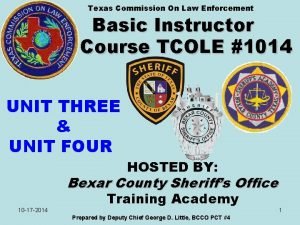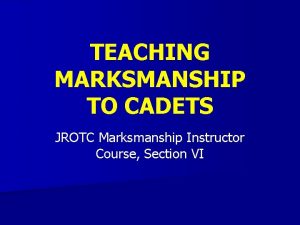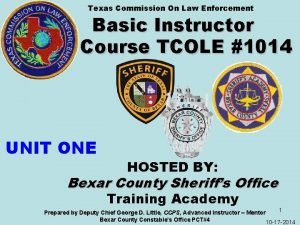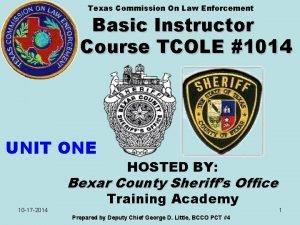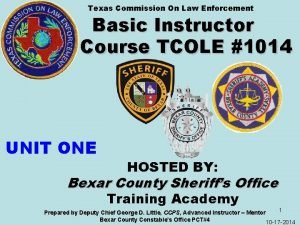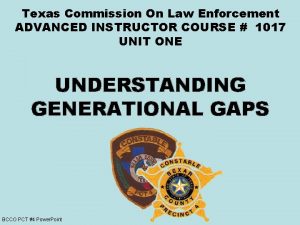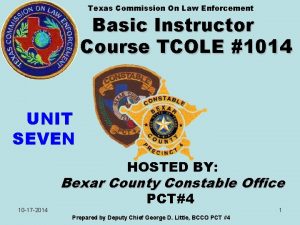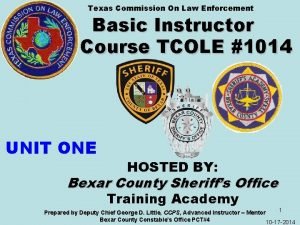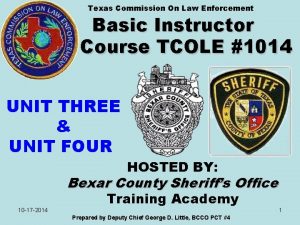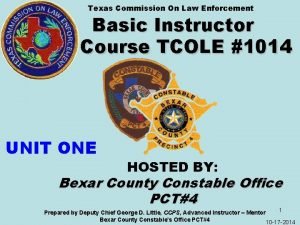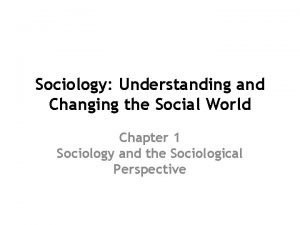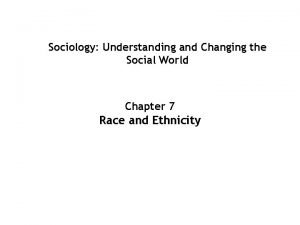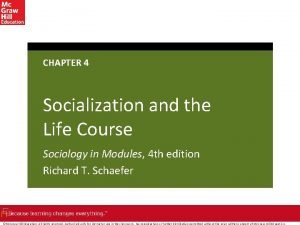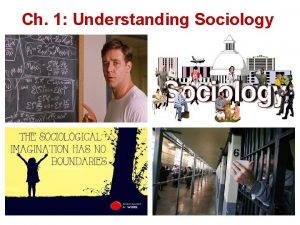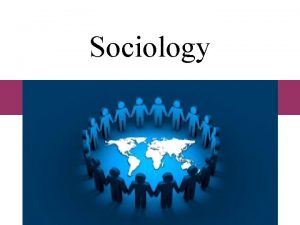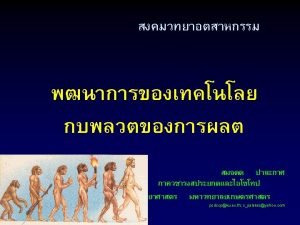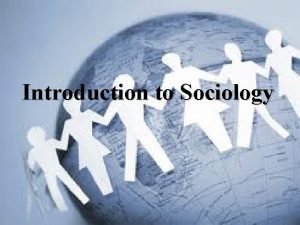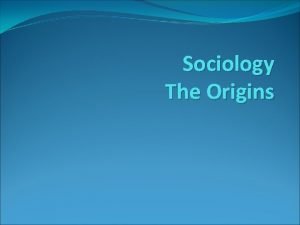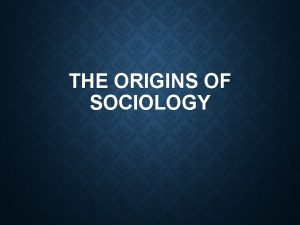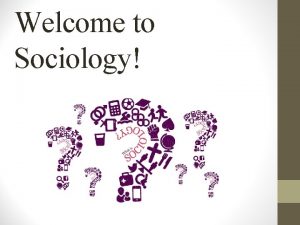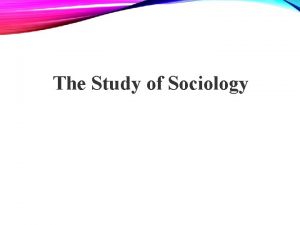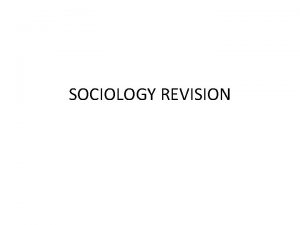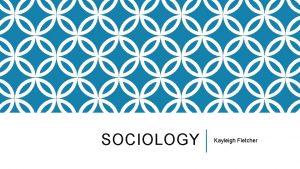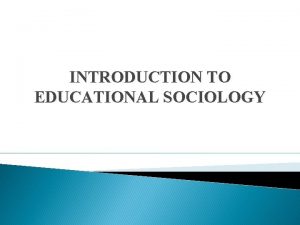Understanding Sociology Course instructor Dr Dilshad Hamad Ishik

















- Slides: 17

Understanding Sociology Course instructor: Dr. Dilshad Hamad Ishik University-IRD Basics of Sociology-IRD 115 Fall 2018 -10

Learning Objectives § to understand sociology as a field of knowledge and grasp key sociological concepts. § to explore sociological questions and sociological enquiry § To become familiar with main sociological perspectives

Warm Up! Write down a question that you have had in mind recently. Something that you have been wondering why it is the way it is. This could be a question about social life, politics, economy, religion and so forth.

What is Sociology? Sociology is the study of groups and group interactions, societies and social interactions, from small and personal groups to very large groups. Society: A group of people who live in a defined geographic area, who interact with one another, and who share a common culture.

Culture: refers to the group’s shared practices, values, and beliefs. Culture encompasses a group’s way of life, from routine, everyday interactions to the most important parts of group members' lives. Sociological Imagination: sociologist C. Wright Mills described it as an awareness of the relationship between a person’s behavior and experience and the wider culture that shaped the person’s choices and perceptions. It’s a way of seeing our own and other people’s behavior in relationship to history and social structure (1959).

Micro vs. Macro Sociology Micro Macro • How things work at • focuses on broader the one-on-one, person to person level. • how and why people make decisions from moment to moment. • how people act in the light of their personal needs and social circumstances social phenomenon • top-down analysis • it studies systems and institutions

How sociologists view society? All sociologists are interested in the experiences of individuals and how those experiences are shaped by interactions with social groups and society as a whole. To a sociologist, the personal decisions an individual makes do not exist in a vacuum. Cultural patterns and social forces put pressure on people to select one choice over another. Sociologists try to identify these general patterns by examining the behavior of large groups of people living in the same society and experiencing the same societal pressures.

Class Exercise How to Explain Job preferences? What makes you choose job A but not B? What are the factors that you consider when you think of a job?

Social Facts the laws, morals, values, religious beliefs, customs, fashions, rituals, and all of the cultural rules that govern social life.

Studying part and whole: how sociologists view social structures A key basis of the sociological perspective is the concept that the individual and society are inseparable. It is impossible to study one without the other. German sociologist Norbert Elias called the process of simultaneously analyzing the behavior of individuals and the society that shapes that behavior figuration.

History of Sociology Auguste Comte (1798 -1857)-- Positivism • In 1838, the term Sociology reinvented by Auguste Comte. � social scientists could study society using the same scientific methods utilized in natural sciences. � believed in the potential of social scientists to work toward the betterment of society. He held that once scholars identified the laws that governed society

Karl Marx (1818 -1883) � He believed that societies grew and changed as a result of the struggles of different social classes over the means of production. � Marx predicted that inequalities of capitalism would become so extreme that workers would eventually revolt. This would lead to the collapse of capitalism, which would be replaced by communism. � Communism is an economic system under which there is no private or corporate ownership.

Emile Durkheim (1858 -1917) • Durkheim helped establish sociology as a formal academic discipline • Durkheim believed that sociologists could study objective “social facts” � He also believed that through such studies it would be possible to determine if a society was “healthy” or “pathological. ” � He saw healthy societies as stable, while pathological societies experienced a breakdown in social norms between individuals and society.

Theoretical Perspectives q Structural Functionalism q Conflict Theory q Symbolic Interactionism

Structural Functionalism � Functionalism, also called structural-functional theory, sees society as a structure with interrelated parts designed to meet the biological and social needs of the individuals in that society. � Hebert Spencer (1820– 1903), who saw similarities between society and the human body; he argued that just as the various organs of the body work together to keep the body functioning, the various parts of society work together to keep society functioning. � The parts of society that Spencer referred to were the social institutions, or patterns of beliefs and behaviors focused on meeting social needs, such as government, education, family, healthcare, religion, and the economy.

Conflict Theory • Conflict theory looks at society as a competition for limited resources. �Karl Marx (1818– 1883), who saw society as being made up of individuals in different social classes who must compete for social, material, and political resources such as food and housing, employment, education, and leisure time. �Weber noted that different groups were affected differently based on education, race, and gender, and that people’s reactions to inequality were moderated by class differences and rates of social mobility, as well as by perceptions about the legitimacy of those in power.

Symbolic Interactionism • Symbolic interactionism is a micro-level theory that focuses on the relationships among individuals within a society. � Social scientists who apply symbolicinteractionist thinking look for patterns of interaction between individuals. Their studies often involve observation of one-on-one interactions. For example, while a conflict theorist studying a political protest might focus on class difference, a symbolic interactionist would be more interested in how individuals in the protesting group interact, as well as the signs and symbols protesters use to communicate their
 Hamad rasool
Hamad rasool Tcole 1014 basic instructor course
Tcole 1014 basic instructor course Jrotc marksmanship instructor course online
Jrotc marksmanship instructor course online Pepperball instructor course
Pepperball instructor course Jrotc marksmanship instructor course online
Jrotc marksmanship instructor course online Basic instructor course texas
Basic instructor course texas Basic instructor course #1014
Basic instructor course #1014 Basic instructor course #1014
Basic instructor course #1014 Tcole advanced instructor course
Tcole advanced instructor course Basic instructor course texas
Basic instructor course texas Basic instructor course #1014
Basic instructor course #1014 Basic instructor course #1014
Basic instructor course #1014 Tcole advanced instructor course
Tcole advanced instructor course Basic instructor course tcole
Basic instructor course tcole Debunking motif definition
Debunking motif definition Sociology understanding and changing the social world
Sociology understanding and changing the social world Life course sociology definition
Life course sociology definition Course interne course externe
Course interne course externe

